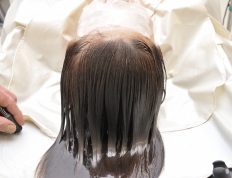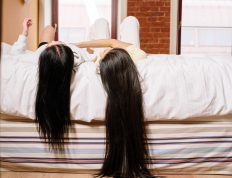
Each morning, you wash your hair. But as evening approaches, your scalp tends to become greasy! You are not alone. We understand that oily hair is a widespread issue. And more often than not, it is not just the greasy scalp condition that irritates you, but also the itching, dandruff, and other issues associated with an oily scalp. With the correct oily scalp treatment, you can easily overcome your greasy hair situation.
What Makes Your Hair Oily?
Sebaceous glands that are hyperactive can contribute to an oily scalp. Your scalp is lined with small pores that conceal the sebaceous glands. They create a naturally occurring oil known as “sebum.”
Sebum is necessary for a healthy scalp and hair. However, several variables may contribute to an excess of sebum production in your skin/scalp, resulting in greasy hair.
- Genes: your genes play a significant influence in determining whether you have an oily scalp or not. If any members of your direct family have oily scalps/skin, there is a chance that you may as well.
- Personal Hygiene: if you do not wash your hair for an extended length of time, sleep with unclean bed sheets as pillow covers, or use soiled hair tools, you may get an oily scalp.
- Frequent Hair Washing/Aggressive Scrubbing: washing your hair too vigorously or frequently can contribute to the loss of your natural barrier. This may cause your sebaceous glands to overproduce oil in an attempt to keep your scalp hydrated.
- Wrong Hair Care Products: using harsh hair care products might cause harm to the protective barrier on your scalp. This might result in the loss of vital oils, causing your sebaceous glands to create excessive amounts of sebum.
- Unhealthy Eating Habits: our food may also play a factor in this. Consumption of high-carbohydrate meals, oily and spicy foods, and foods devoid of nutritious value has been associated with oily skin and scalp.
- Stress: if your stress level is up, your sebaceous gland activity is likely to increase. This may result in an oily scalp.
- Hormonal Changes: pregnancy, irregular cycles, menopause, and puberty all result in hormonal changes that can have an effect on your scalp’s oiliness.
Effective Oily Scalp Treatment and Management
While an oily scalp will often result in clogged pores, collection of impurities, and even hair loss making your hair appear limp and lifeless, there are some home care tips, simple remedies, and professional hair treatments that could easily help you treat an oily scalp.
Revise your hair washing regime
There is no hard and fast rule when it comes to hair washing. Depending on your hair and scalp type, washing your hair 2-3 times a week is sufficient to maintain a healthy scalp. If you work out regularly you could wash your hair every other day and use a mild shampoo.
Invest in good hair care products and shampoo the correct way
Choosing the correct shampoo as well as how you shampoo your hair can play a major role when it comes to your scalp health. Make it a point to dilute your shampoo in water before applying it to your scalp. Then gently massage, lather up and wash off.
Avoid using conditioner on the scalp
Irrespective of your scalp type one must avoid applying conditioner on the scalp like the plague. It is a big NO!
Disinfect your hair accessories and tools and restrict using heating tools
Cleaning your brushes regularly and staying away from hair styling tools such as curling irons, blow dryers, and straightening irons can greatly benefit your scalp health.
Invest in a good hair mask/pack
A scalp mask can nourish and restore the scalp and help achieve healthier hair. They can be customized to address specific hair issues and combine the best natural ingredients to balance scalp disorders and encourage proper scalp function.
Invest in herbal scalp therapy treatment
A herbal scalp therapy with essential herbs and carrier oils can greatly benefit your scalp health. They are full of nourishing and cleansing properties and will help restore proper scalp balance and regulate scalp health over time.
The first step towards treating oily scalp issues is to understand what causes oily scalp. Once you figure out the cause, you can take measures to deal with the same. If you are already suffering from this problem, you can book an appointment with a professional hair care provider who can assess your scalp condition and offer you the best oily scalp treatments available in Singapore.





